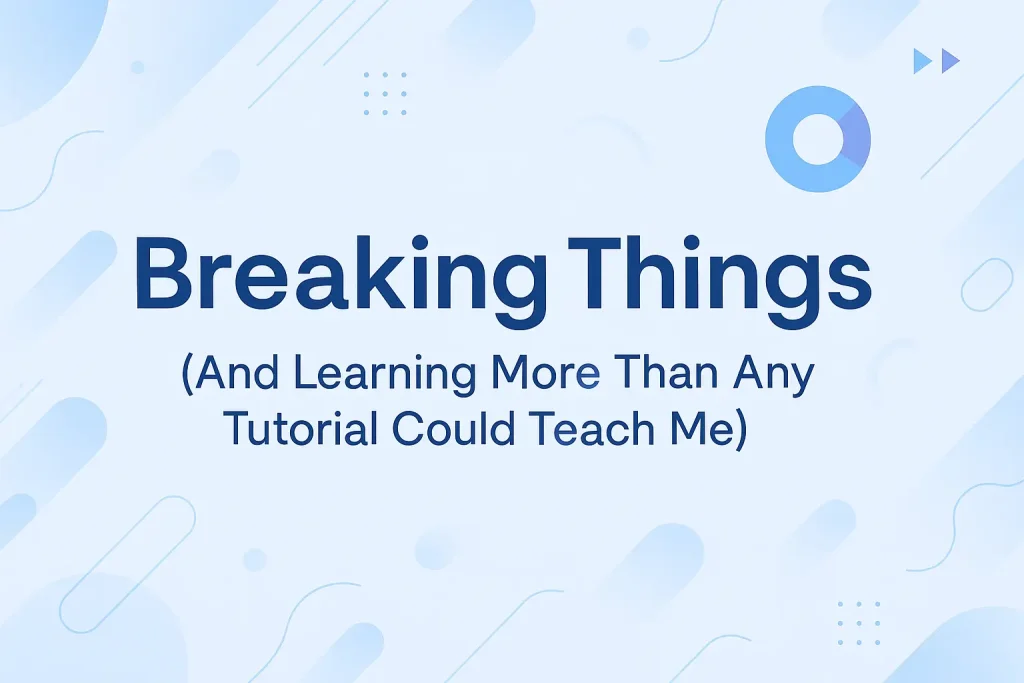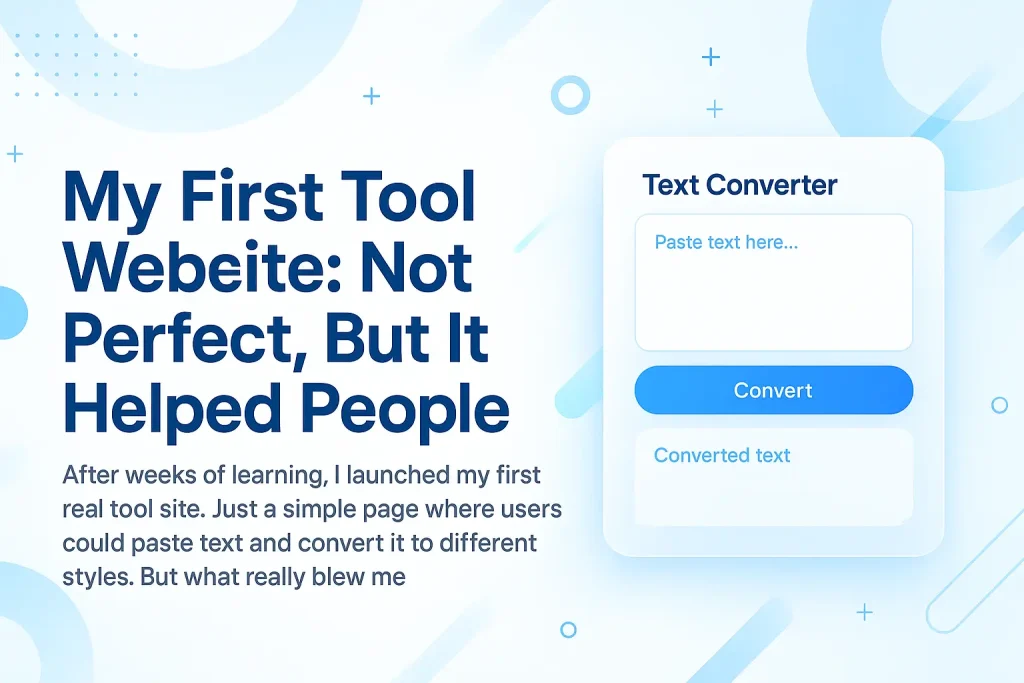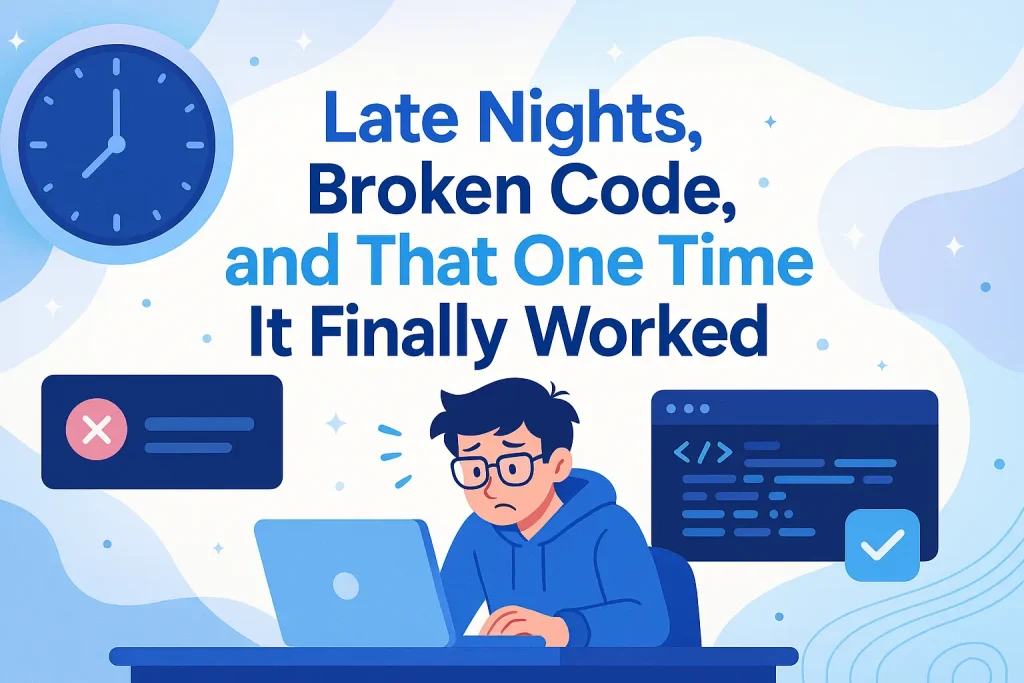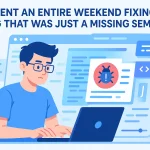Hi, I’m Rifat, and if there’s one thing that defines my journey in web development so far, it’s this: things rarely go right the first time. Or the second. Or even the third. But when it does work… oh man, it feels like magic. This is the story of those chaotic late nights, broken code that made no sense, the doubts, the breakthroughs, and yes — that one time it finally worked and everything changed.
Why I Chose to Learn Web Development (And Not Something Easier)
Okay, real talk: I didn’t grow up writing code. I didn’t come from a tech background. But I always had this urge to build something real — stuff that people could use. Like tools that help solve problems or just make life easier.
So naturally, I chose web development — which sounds fun until you’re staring at your screen for 6 hours trying to figure out why your button won’t center.
At first, I thought learning HTML, CSS, and JavaScript would be a cakewalk. But nope. It was like learning to speak a new language, except every time I got something wrong, my “teacher” (aka my browser console) would just throw a red error message at me and peace out.
The Reality of Late-Night Coding: Romantic or Just Plain Madness?
If you’ve ever imagined a dreamy scene where a passionate dev sips coffee at 2AM while building the next big app — forget it. Real late-night coding looks like this:
- Hair everywhere (even if you’re bald, you’ll grow some just to pull it out)
- StackOverflow tabs multiplied like rabbits
- A blinking cursor mocking you
- A random error that says:
undefined is not a function(but it clearly IS)
There’s this phase in learning where you know enough to break everything, but not enough to fix it. That’s the zone I was in.
Breaking Things (And Learning More Than Any Tutorial Could Teach Me)

Let me tell you about a specific night I still remember — the one that almost made me quit.
I was building this little tool website. Simple idea: a text converter that takes input and transforms it into different formats like camelCase, snake_case, and so on. Nothing wild. I coded it in HTML, added some basic JavaScript functions, and everything looked good. Until I hit “Convert”.
Nothing happened.
I opened the dev tools. Boom — Uncaught TypeError: document.querySelector(...) is null. Huh?
I checked my code. It looked fine. I’d watched like three YouTube tutorials. I’d followed every step. But still, broken code.
That one bug led me down a 6-hour rabbit hole. I learned more that night about how the DOM works, how script tags should load, and the difference between inline scripts vs. deferred ones, than I ever learned from a full-day tutorial binge.
That One Time It Finally Worked: The Best Feeling in the World
After fighting with my broken code all night, I eventually realized the bug was something so stupid — I had mistyped an ID in the HTML. Instead of id="textInput", I’d written id="textinput". That was it. That was the cause of all my pain.
I corrected it. Hit refresh. Clicked “Convert”.
And it worked.
That single moment gave me more confidence than any success before it. Not because it was a big project or super impressive — but because I’d fixed it myself.
That’s when I realized: this is how developers grow — by breaking stuff and fixing it again.
Web Dev Is More Than Code: It’s Mindset, Curiosity, and Obsession
Here’s what they don’t tell you in tutorials: knowing syntax is cool, but real development is more about your brain than your code.
It’s about:
- Sticking with a problem even when it’s not obvious
- Googling the right question (a skill that takes time)
- Knowing how to debug instead of just rewriting everything
- Asking for help, even when you feel dumb
Yeah, you’ll eventually learn frameworks like React or Vue, and build cool tools, but you need the mindset way before the code.
And trust me, mindset is something I had to develop the hard way.
Table: My Progress in 6 Months of Learning Web Dev
Let’s break down what my journey looked like from Day 1 to Month 6:
| Month | Focus Area | Wins | Struggles |
|---|---|---|---|
| 1 | HTML, CSS Basics | Learned layout, built basic pages | Centering divs, responsiveness |
| 2 | JavaScript Basics | Wrote simple functions | Variable scopes, DOM manipulation |
| 3 | Project: Text Tool Website | Built my first tool from scratch | Debugging, logic errors |
| 4 | Git & Deployment | Deployed site on GitHub Pages | Git errors, merge issues |
| 5 | Responsive Design | Made mobile-friendly layouts | Flexbox nightmares |
| 6 | JS Advanced Concepts | Learned event delegation, API calls | Asynchronous code confusion |
It wasn’t smooth. But each step taught me something real.
One Mistake I Made (That You Should Avoid)
There was a period where I jumped into frameworks too early — React, Tailwind, Next.js — without really mastering JavaScript.
That backfired big time.
I was stuck copying code from tutorials without actually understanding what it did. It’s like trying to write poetry in French when you barely know the alphabet.
So if you’re in the early phase, do yourself a favor and learn the core stuff first. You’ll thank yourself later.
My First Tool Website: Not Perfect, But It Helped People
After weeks of learning, I launched my first real tool site. Just a simple page where users could paste text and convert it to different styles. But what really blew me away?

People used it.
Like, real humans. I got a message from someone saying they used it for formatting data before uploading it to an internal dashboard.
That’s when it clicked: even a tiny tool can make a big difference.
That’s why I keep building — to make small things that solve real problems.
Frequently Asked Questions (FAQs)
Q: How do you stay motivated when nothing works?
Honestly, I don’t always. I take breaks, scream into a pillow (lol), then come back. But when something finally clicks, the reward is so worth it.
Q: How long did it take before you felt like you were improving?
About 3 months in. That’s when I started to solve bugs quicker, and understand what the code was actually doing.
Q: Do you still break things today?
Yes. Every week. It’s part of the job. Breaking things = learning new things.
Q: What’s your next goal?
I want to build more complex tool websites, learn backend stuff like Node.js, and maybe explore AI tools for productivity.
Final Thoughts: If You’re In That Struggle Phase, Keep Going
I’m not a coding genius. I didn’t start with a silver spoon or a CS degree. I just kept trying things, breaking them, googling stuff, and slowly building a brain that thinks like a dev.
If you’re where I was — stuck, confused, second-guessing yourself — don’t quit. That moment where your code finally works will come. And it will hit different.
And maybe someday, you’ll be up late, sipping tea or coffee, staring at a screen that finally says: “Build successful.”
Written by Rifat — a web dev enthusiast who still writes code at 3AM and believes that tool websites can change the world in small but meaningful ways.



